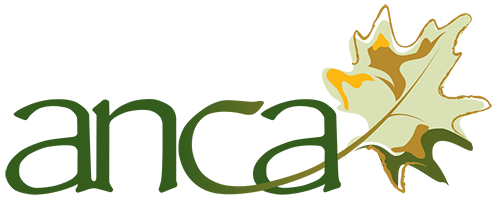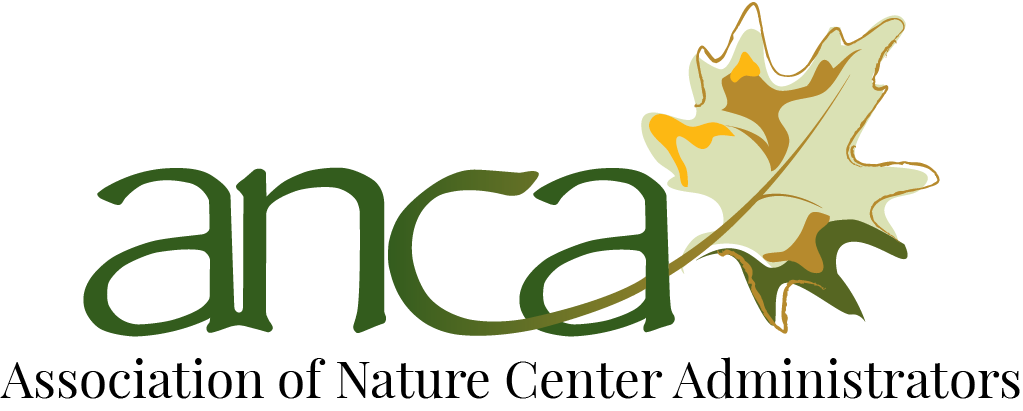By Asa Duffee
Marketing & Communications Coordinator, ANCA
Note: This article was originally published in the Summer 2020 issue of Directions, the ANCA journal. Members can access the full issue via the member portal.
Since March, we’ve all heard the word “unprecedented” repeated ad nauseum to describe the pandemic and our current circumstances. Yet while it’s true that the field of nature centers has never faced a situation quite like this, it’s also true that nearly every organization has endured some form of significant crisis in the past, and that organizational leaders had to navigate those crises.
Knowing that ANCA Emeritus Members have been those leaders during times of challenge, we spoke with a few Emeritus Members to share the lessons that they gathered through such experiences.
Holly Dill
Holly Dill, retired Executive Director of the Environmental Learning Center (ELC) in Vero Beach, FL, had much to take in when daylight broke upon the ELC on the morning of July 1, 2008. The night before, an intense storm passed through and lightning struck the ELC’s largest building, resulting in a fire that destroyed the building and an adjacent public restroom facility.
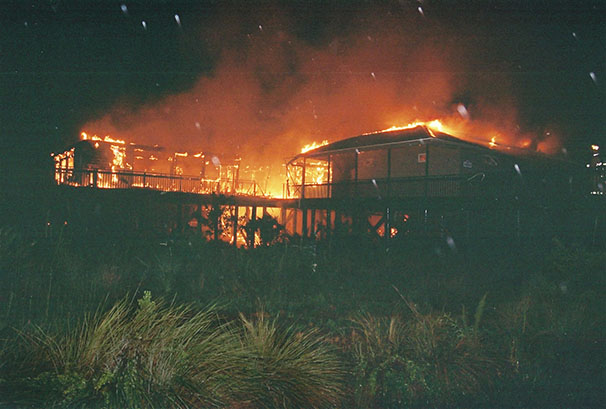 The fire at the Environmental Learning Center on the night of June 30th, 2008. Photo provided by Holly Dill.
The fire at the Environmental Learning Center on the night of June 30th, 2008. Photo provided by Holly Dill.
“It was so severe and so abrupt,” Dill recalls of the incident.
While the organization had contingency plans for natural disasters such as hurricanes, such plans didn’t necessarily apply to the situation — in hurricanes, warnings come in advance and you can prepare accordingly. The abruptness of the fire, however, meant that all the contents of the buildings were destroyed.
In the nature and environmental learning center field, we often observe that staff are particularly adaptive, due to the unpredictability of both nature and working with the public. The staff of the ELC proved that observation true in this situation, as they were in the midst of summer camps, and thus parents were dropping off their children that morning right as the staff was processing what had happened. They scrambled to safely host the camps and were able to pull it off with creative and quick thinking.
Meanwhile, Dill had to similarly take fast action, starting by communicating with the board, staff, and the larger community. Because of the quick awareness, the community rallied to support the organization.
“Literally, that first day, we had scientists calling us, saying, ‘We’re dropping off used nets and sampling equipment out of our closets’ because they knew our summer camps were going on,” Dill says, as all of the ELC’s equipment was lost to the fire. “It was just amazing how people wanted to help.”
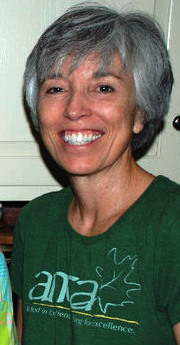 Holly DillDill took the process step by step, leading a fundraising campaign to construct new buildings. In May 2010, the ELC hosted a re-opening celebration that showcased its new Discovery Station building.
Holly DillDill took the process step by step, leading a fundraising campaign to construct new buildings. In May 2010, the ELC hosted a re-opening celebration that showcased its new Discovery Station building.
Dill says that though the sudden tragedy was difficult, there were still lessons that she learned along the way.
“All help is important, no matter how big or small,” she says. The ELC’s community rallied together in support of the organization, and that rallying was not just beneficial from a financial perspective, but also in bringing the community together. Children hosted lemonade stands and readathons, which Dill saw as an important part of engaging the ELC’s audiences.
There were other silver linings to the situation, too. “We also realized that we could view it as seeing the glass as half-full,” Dill says. “It gave us an opportunity to redesign the buildings and it allowed us to recreate what worked, but to improve what did not work.” The result was that the new buildings achieved Green Globe certification and worked better for hosting exhibits than the previous buildings.
Dill recognizes that the ELC’s situation did not necessarily parallel the pandemic, as there are universal effects from the coronavirus. “With the pandemic, everybody’s affected,” she says. “In our situation with the fire, the community rallied around us because it was just this one aspect of the community that was affected.”
Ken Voorhis
Ken Voorhis, retired Executive Director of the Great Smoky Mountains Institute at Tremont (GSMIT) and retired Chief Education and Operations Officer at Yellowstone Forever, when asked about any crises he has faced as a leader, listed off a number of unfortunate circumstances.
“Several government shutdowns, a flood that washed out our entrance road, a blizzard that had a group stranded for several days and no power for 10, norovirus that went through a group of 100 college students that were with us for a week, lost students, etc,” he responded. From those combined experiences, Voorhis says he learned valuable lessons in responding to any crisis as the leader of an organization.
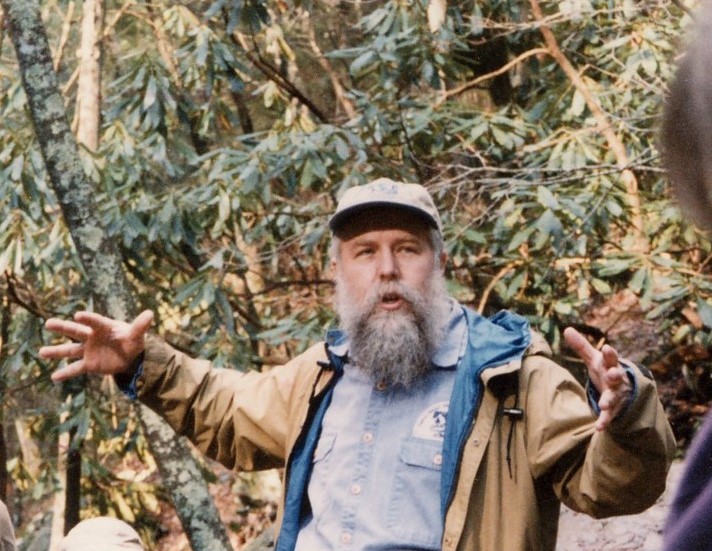 Ken VoorhisVoorhis says it’s first important to pause before reacting. During crises, “we needed to step back and take time to think and be careful about our first gut reaction” because that reaction isn’t usually the appropriate course of action, he says. Instead, gathering information and then forming a plan should be the first step.
Ken VoorhisVoorhis says it’s first important to pause before reacting. During crises, “we needed to step back and take time to think and be careful about our first gut reaction” because that reaction isn’t usually the appropriate course of action, he says. Instead, gathering information and then forming a plan should be the first step.
Following the plan, then, clear communication is vital. “You have to give answers as soon as you can, and be as completely transparent with those as possible,” says Voorhis. Even in situations like the pandemic where there are many unknowns, it’s still important to communicate what you don’t know, but are working to find out.
Even though the pandemic is difficult to predict, Voorhis says that planning and training in advance is invaluable for all types of crises. By running through various scenarios together, the staff develop a culture of being better prepared for any situation. In this way, too, you can develop a clear communication and decision-making process, where you have one point person who can direct others in any given scenario.
Suzanne Tuttle
Suzanne Tuttle, retired Manager of the Fort Worth Nature Center & Refuge (FWNC&R) in Fort Worth, TX, faced a different situation than the drastic events at the Environmental Learning Center or Great Smoky Mountains Institute at Tremont. The city itself owned and operated the nature center, but due to the Great Recession they began to explore the possibility of outsourcing the staffing to the friends group that aided the center’s work.
This possibility endured eighteen months of examination, during which time the future of the staff was uncertain. There was no guarantee that the friends group would maintain the same level of pay and benefits as the city, and some of the staff would have had to reapply to their jobs.
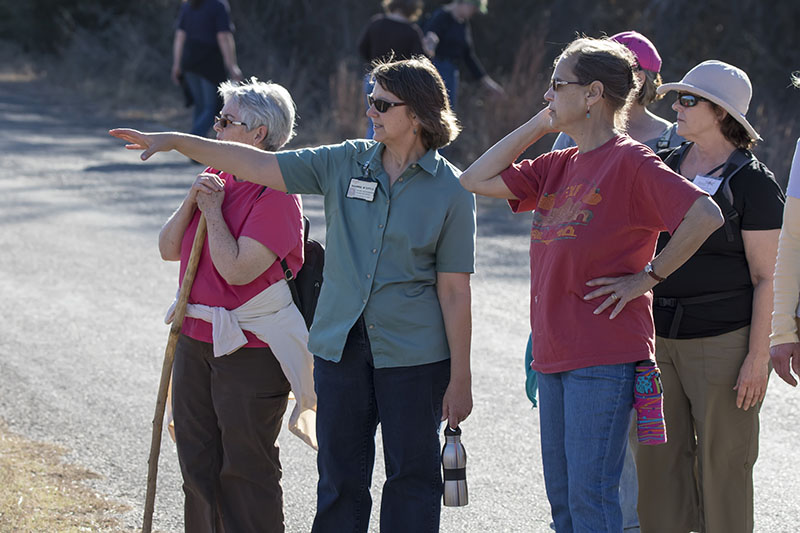 Suzanne Tuttle (pointing) leading a tree ID hikeAs such, the staff felt some degree of stress about the possible changes. “It was kind of hard to keep morale up. I tried to be as completely open and forward about what was going on as I could, but I didn’t really have total control over the outcome,” Tuttle says.
Suzanne Tuttle (pointing) leading a tree ID hikeAs such, the staff felt some degree of stress about the possible changes. “It was kind of hard to keep morale up. I tried to be as completely open and forward about what was going on as I could, but I didn’t really have total control over the outcome,” Tuttle says.
Ultimately, the city decided not to transfer the responsibilities to the friends group. The FWNC&R remains a division of the city today, and is still supported by the Friends of the FWNC&R.
Tuttle says that throughout that process, her primary goal was to communicate with the staff as best she could. “I just tried to be as transparent as possible about what I knew, what had been discussed,” she says. Asked about advice for leaders today, she advises, “Be as honest and open about the situation as you can, and set a good example.”
Learning from crisis
The pandemic is uncharted territory for everyone, but these lessons from Dill, Tuttle, and Voorhis share common ground for organizational leaders. Clear communication, protocols and preparation, and a willingness to embrace change are all standards that current leaders can use to navigate our current collective crisis.
Dill specifically mentions that no matter what the results of a crisis are, there’s opportunity to grow and learn through one’s experiences. “It’s important to learn through what you’re going through,” she says.
Hopefully, then, one day years from now, you’ll share your own lessons learned from the 2020 pandemic.
———
Want more stories like this? Check out the benefits of ANCA membership:
